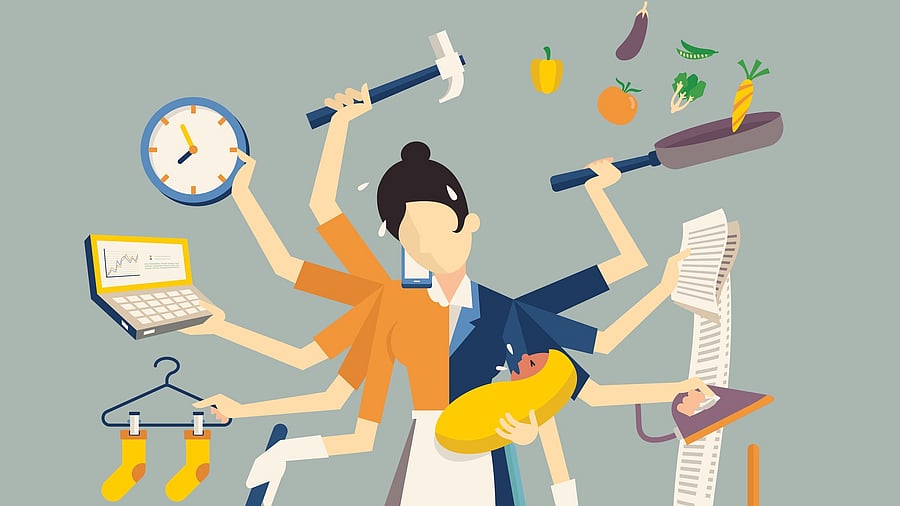
Illustration showing a woman trying to balance professional commitments and domestic chores
Credit: iStock Photo
In India, we continue to wrestle with an uncomfortable paradox — the celebration of women’s potential on one hand, and their systemic subjugation on the other. We preach equality, yet persist in treating half of our population as recipients of benevolent ‘offers’ rather than rightful claimants to opportunities, rights, and agency.
As we celebrate another Women’s Day today, one might ask: What has truly changed in the way we perceive, engage with, and empower women? We oscillate between affirmative action, policy slogans, and token gestures that do little to alter the deep-rooted biases and structural barriers that persist.
Who are we, after all, to ‘offer’ equality to over 50% of our population when it is fundamentally theirs, and has been unjustly stalled by societal inertia and prejudiced paradigms? How long would men tolerate being overlooked, silenced, and dismissed daily, only to be granted a single day of acknowledgment? The answer is clear — they wouldn’t. So why should women?
Despite growing visibility, Indian women continue to face deep-rooted gender norms in the workforce. The International Labour Organization (ILO) highlights that India’s female labour force participation rate stands at just 31%, far below the global average of 49%. As a result, women remain a largely untapped demographic resource in India’s progress.
McKinsey’s Global Institute estimates that advancing gender parity could add $770 billion to India’s GDP by 2025. Yet, our society remains reluctant to view gender equity as a business advantage, not just a social cause. While we celebrate India’s economic potential, half of it remains tethered by outdated attitudes and practices.
Similarly, deep-rooted societal beliefs have pushed many women to internalise the idea that their primary role lies within the family, forcing them to sacrifice career ambitions for the sake of others.
The primary caregiving role women are expected to shoulder remains the greatest barrier to their full economic participation. The 2024 Time Use Survey reveals that women spend 305 minutes a day on unpaid domestic work, compared to just 88 minutes by men. Additionally, women dedicate 140 minutes daily to caregiving, while men spend only 74 minutes. This stark imbalance, reinforced by societal expectations, keeps women from fully engaging in the workforce, despite their qualifications and potential. Even when they break free from these confines, they are either praised as ‘exceptional’ for defying the norm or penalised for challenging societal conventions.
This contradiction is glaring in our society’s simultaneous celebration of goddesses during festivals — symbols of strength, resilience, and power — while the harsh reality of women’s treatment in our homes, workplaces, and streets remains unchanged. We revere female deities as paragons of empowerment, yet societal norms continue to confine women to the private sphere, reinforcing outdated views that their primary role lies within the family.
At the same time, the commodification of women’s identity persists, reducing them to their looks or utility in maintaining traditional roles. Whether in advertising, entertainment, or social media, women are often marketed as ‘products’, their worth determined by beauty standards or narrow stereotypes. The rise of female influencers endorsing products highlights that they are not seen as agents of change.
The policies we champion in the name of women’s empowerment often fall short in practice. While schemes for women’s entrepreneurship and leadership abound, the practical barriers remain. Access to formal credit, societal stigma, and a lack of a supportive infrastructure continue to undermine efforts to empower women economically. Deep-seated attitudes that view women as second-class citizens won’t change until we stop paying lip service to equality and start dismantling the biases that still define their worth.
In 2024, only 9.6% of candidates in the Indian general elections were women, resulting in a decrease in the number of women in the Lok Sabha. This speaks volumes about the barriers to women’s full participation in political life, where their representation remains token.
Business leaders, regulators, bureaucrats, and politicians seldom challenge organisers when invited to an all-male panel, despite often claiming to be champions of inclusion and ESG principles. By tacitly accepting such invitations, they reinforce the boys’ club culture, undermining any credibility they have in advocating for true gender parity.
More than half of India’s listed entities don’t have a single female CXO, and most of the Nifty 100’s top conglomerates lack a female CEO across their entire group companies. India Inc. likes to boast of its education, broad-mindedness, and culture, but its failure to promote women to leadership positions reveals a stark contradiction that no amount of self-congratulation can hide. Yet, the male leaders of these firms continue to glorify their ‘tireless hard work’, conveniently crediting their wives for sacrificing their own careers to prop up theirs. How much longer will this farce continue?
(Srinath Sridharan is a corporate adviser and independent director on corporate boards. X: @ssmumbai.)
Disclaimer: The views expressed above are the author's own. They do not necessarily reflect the views of DH.